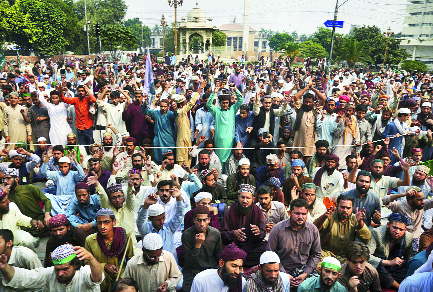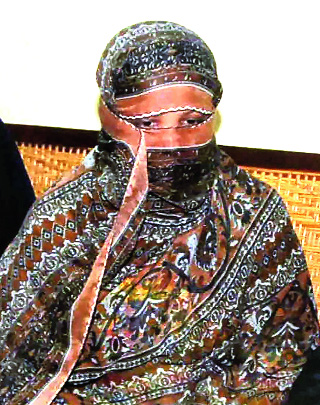
Tehreek-e-Labaik supporters protest against the Supreme Court’s decision to acquit Asia Bibi in Lahore on Wednesday. Photo by Handout / Punjab Governor’s House / AFP, AP
Pakistan’s Supreme Court on Wednesday acquitted Asia Bibi — a Christian woman accused of blasphemy in 2010 and sentenced to death — by quashing an earlier judgment passed by a lower court and sparking countrywide protests.
Chief Justice Saqib Nisar, who headed a special three-judge bench set up for the appeal, said “tolerance is the basic principle of Islam” and noted that the religion condemns injustice and oppression. In overturning her conviction, the ruling said the evidence against Bibi was insufficient.
“The appeal is allowed and judgment of the high court as well as the trial court reversed. Her conviction is set aside,” the chief justice said.
Bibi’s counsel Saiful Malook said while talking to the media that her client got justice in the end and the case has been proven false.
She was condemned for allegedly making derogatory remarks about Islam after neighbours objected to her drinking water from their glass because she was not Muslim. Bibi has always denied committing blasphemy.
The case has outraged Christians worldwide — Pope Francis said he personally prayed for Bibi — and has been a source of division within Pakistan, where two politicians who sought to help Bibi were assassinated.
Security was stepped up across Pakistan in the wake of the verdict as protesters, mainly under the banner of Tehreek-e-Labaik, began to assemble in all major cities, including the capital, to hold protests.
Police placed containers to block major arteries in Karachi, Lahore and Islamabad to prevent the protesters reaching sensitive installations and buildings.
Protesters in Karachi shouted slogans, “Down with the Government”, as they began assembling at different places.
While human rights activists hailed the judgment, the religious Right warned of serious consequences.
Spokesman of the independent Human Rights Commission of Pakistan, I.A.Rehman welcomed the verdict and told The Telegraph: “The judiciary has upheld principles of justice.”
Deputy chief of the Jamaat-e-Islami Pakistan, Liaqat Baloch told The Telegraph that the verdict had upset the people and sparked a wave of anger across the country.
Pakistan People’s Party spokesman Farhatullah Babar tweeted: “Asia Bibi acquitted by SC. Most laudable, most welcome. Salute to honble judges who, refusing to be cowed down, have lit a candle in darkness and raised hopes in hopelessness. Also spare a thought for Salman Taseer who raised voice for her and paid with his life for it.”
Another senior PPP leader and former information minister Senator Sherry Rehman tweeted, “Landmark judgment by Supreme Court to acquit #AsiaBibi today.False accusers took half her life away. Now the state must protect all those who stand for the rule of law and justice.We have all been witness to the havoc mobs have wreaked to red lines before.”
Prime Minister Imran Khan told hardliners not to “confront the State” and refrain from vandalism.
Addressed the nation through a video message, Khan said his address was solely focused on the Asia Bibi verdict.
“I ask these elements (protestors) to avoid confronting the state. But if they opted to do so, the State will fulfill its responsibilities,” Khan said.
“We will protect life and property of people...We will not let them (protesters) involve in vandalism or close down the roads,” he said, referring to the protesters.
Asia Bibi, 51, was on death row since November 2010 after she was convicted on charges of committing blasphemy.
Slain governor of Punjab Salman Taseer was shot dead in early 2007 in Islamabad by his police guard Mumtaz Qadri, who confessed to killing Taseer as “black law”.
Taseer had been receiving threats from hardliners after he annoyed religious parties and groups for meeting Asia Bibi. He had also handed a mercy petition of Bibi to then President Asif Ali Zardari, saying that she was victim of personal enmity and that the blasphemy law was a black law which needed to be repealed.
In February, Bibi’s husband, Ashiq Masih, and one of her daughters met Pope Francis shortly before Rome’s ancient Coliseum was lit in red one evening in solidarity with persecuted Christians, and Bibi in particular.
The pope told Bibi’s daughter: “I think often of your mother and I pray for her.”
Dozens of Pakistanis — including many minority Christians or members of the Ahmadi faith — have been sentenced to death for blasphemy in the past decade, though no one has actually been executed. Rights groups say the blasphemy law is exploited by religious extremists as well as ordinary Pakistanis to settle personal scores.











